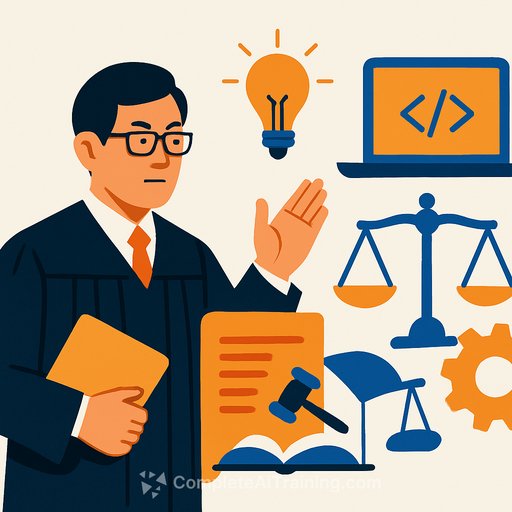Singapore's Chief Justice Urges Lawyers To Reimagine Their Role As Tech Matures
On September 16, 2025, Singapore's Chief Justice, Sundaresh Menon, called on the profession to evolve its skillsets and mindsets to keep pace with technological change. His message is clear: legal work is shifting, and lawyers who adapt will set the standard for value, ethics, and client outcomes.
Why this matters
Clients expect speed, precision, and sound judgment. AI, automation, and data-driven work are raising the bar on each. The lawyer's role is expanding from issue-spotting and drafting to designing processes, advising on technology risks, and guiding organizations through high-stakes decisions.
The skillset modern lawyers need
- AI literacy: Know what current tools can and cannot do, where errors occur, and how to manage confidentiality and privilege.
- Data and process fluency: Map recurring work, standardize templates, and track cycle times, costs, and quality.
- Product thinking: Turn repeatable matters into clear service offerings with scoped steps, SLAs, and pricing.
- Prompting and review: Write prompts that reflect facts, law, and format; implement peer review and output audits.
- Cybersecurity and privacy: Apply minimum safeguards, vendor due diligence, and retention rules.
- Tech risk counseling: Advise clients on AI governance, IP, bias, and regulatory exposure.
The mindset shift
- From artisanal work to systems: Build repeatable workflows that reduce variance and surface risks early.
- From solo expertise to collaboration: Work with operations, data, product, and security to deliver outcomes.
- From hours to results: Price for value where possible and make efficiency a feature, not a threat.
- From caution-only to tested adoption: Pilot new tools with guardrails instead of waiting for perfect certainty.
A practical 90-day plan
- Week 1-2: Identify three high-volume tasks (e.g., first-draft NDA, matter intake, research memo outline). Define success metrics: time saved, error rate, client satisfaction.
- Week 3-4: Choose one AI tool and one automation for pilots. Set a data policy: what can be shared, redaction steps, and storage rules.
- Week 5-6: Create standard prompts and checklists. Add a second-review step for any AI-assisted output.
- Week 7-8: Train the team in 60-minute sessions. Record do's and don'ts. Update engagement letters to disclose tool use where appropriate.
- Week 9-10: Run the pilots on real matters with consent. Track metrics and collect feedback.
- Week 11-12: Keep what works, refine what doesn't, and publish a one-page internal playbook.
Ethics and competence
Professional duty now includes staying competent with relevant technology and its risks. See guidance such as the ABA's Comment 8 to Model Rule 1.1 on technological competence for context and benchmarks.
ABA Model Rule 1.1 - Competence
For courts and public service
Judges, prosecutors, and public defenders face the same pressure to deliver accurate, timely, and fair outcomes with limited resources. Clear standards, auditable processes, and responsible tool choices protect due process and public trust.
Keep learning
Upskill on a schedule. Choose one domain each month-prompting, data handling, automation, or AI governance-and apply it to a live matter. Curated training can speed this up.
The bottom line
Menon's call is timely: keep judgment at the center, build new skills around it, and rework your workflows to match how clients buy legal outcomes today. The lawyers who do this will set higher standards for quality, ethics, and efficiency-and win the work that follows.
Your membership also unlocks:






